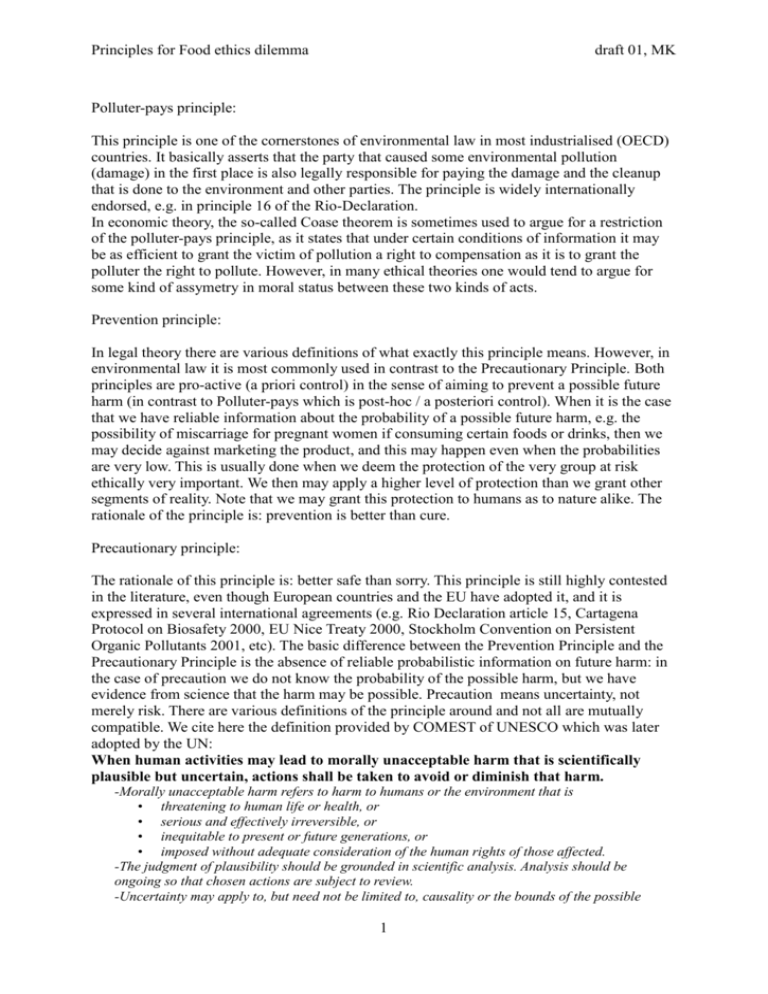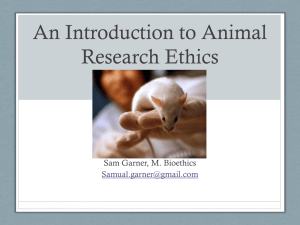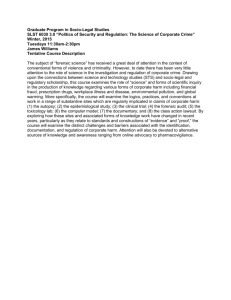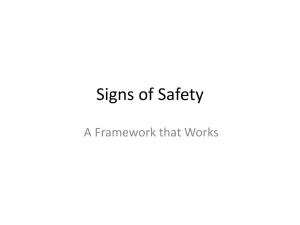Food_ethics_principles_explained
advertisement

Principles for Food ethics dilemma draft 01, MK Polluter-pays principle: This principle is one of the cornerstones of environmental law in most industrialised (OECD) countries. It basically asserts that the party that caused some environmental pollution (damage) in the first place is also legally responsible for paying the damage and the cleanup that is done to the environment and other parties. The principle is widely internationally endorsed, e.g. in principle 16 of the Rio-Declaration. In economic theory, the so-called Coase theorem is sometimes used to argue for a restriction of the polluter-pays principle, as it states that under certain conditions of information it may be as efficient to grant the victim of pollution a right to compensation as it is to grant the polluter the right to pollute. However, in many ethical theories one would tend to argue for some kind of assymetry in moral status between these two kinds of acts. Prevention principle: In legal theory there are various definitions of what exactly this principle means. However, in environmental law it is most commonly used in contrast to the Precautionary Principle. Both principles are pro-active (a priori control) in the sense of aiming to prevent a possible future harm (in contrast to Polluter-pays which is post-hoc / a posteriori control). When it is the case that we have reliable information about the probability of a possible future harm, e.g. the possibility of miscarriage for pregnant women if consuming certain foods or drinks, then we may decide against marketing the product, and this may happen even when the probabilities are very low. This is usually done when we deem the protection of the very group at risk ethically very important. We then may apply a higher level of protection than we grant other segments of reality. Note that we may grant this protection to humans as to nature alike. The rationale of the principle is: prevention is better than cure. Precautionary principle: The rationale of this principle is: better safe than sorry. This principle is still highly contested in the literature, even though European countries and the EU have adopted it, and it is expressed in several international agreements (e.g. Rio Declaration article 15, Cartagena Protocol on Biosafety 2000, EU Nice Treaty 2000, Stockholm Convention on Persistent Organic Pollutants 2001, etc). The basic difference between the Prevention Principle and the Precautionary Principle is the absence of reliable probabilistic information on future harm: in the case of precaution we do not know the probability of the possible harm, but we have evidence from science that the harm may be possible. Precaution means uncertainty, not merely risk. There are various definitions of the principle around and not all are mutually compatible. We cite here the definition provided by COMEST of UNESCO which was later adopted by the UN: When human activities may lead to morally unacceptable harm that is scientifically plausible but uncertain, actions shall be taken to avoid or diminish that harm. -Morally unacceptable harm refers to harm to humans or the environment that is • threatening to human life or health, or • serious and effectively irreversible, or • inequitable to present or future generations, or • imposed without adequate consideration of the human rights of those affected. -The judgment of plausibility should be grounded in scientific analysis. Analysis should be ongoing so that chosen actions are subject to review. -Uncertainty may apply to, but need not be limited to, causality or the bounds of the possible 1 Principles for Food ethics dilemma draft 01, MK harm. -Actions are interventions that are undertaken before harm occurs that seek to avoid or diminish the harm. Actions should be chosen that are proportional to the seriousness of the potential harm, with consideration of their positive and negative consequences, and with an assessment of the moral implications of both action and inaction. The choice of action should be the result of a participatory process. Wait-and-see principle This principle is typically formulated as an alternative to the Precautionary principle. It states that preventive action of any kind should only commence when clear scientific evidence is provided that future harm will actually occur. The kind of action should then be based on a cost-benefit calculation. It intends to avoid unnecessary investments in preventive actions which in hindsight may appear as ungrounded. It is usually justified by reference to the fact that life is never zero-risk and that innovations always carry with them unintended side effects, some of which may be risky. The principle of solidarity This principle is basically a principle about sharing both the benefits and the burdens among the members of a community. So-called welfare-states are modelled around the acknowledgement of the principle. It recognizes that sometimes unequalities may arise in a community that could place certain groups at a serious disadvantage. Especially when these disadvantages are the result of unintended events, the principle asserts that the community should level out the disadvantage. Trade unions are typically based on the principle, but also the European Union has embraced this principle, e.g. in its Chapter IV of the Charter of Fundamental Rights of the European Union. The principle has direct consequences for e.g. social security and health policy by spreading the burden of disadvantages through the whole community. In terms of international policy, the principle seems more to function like a moral principle, e.g. when other countries assist a country that is hit by a natural disaster like an earthquake or similar (e.g. Haiti in 2010). The principal of responsibility: Personal moral responsibility is one of the cornerstones of ethics. It is typically based on the freedom of the will and the concept of action which implies the freedom to act in certain ways or not to act (different from e.g mere reflexes or forced action) given certain information. It recognizes that people may have moral obligations under given circumstances. Under these conditions, when a person acts in a certain way, that person could be held morally accountable for the act, and in some cases even legally accountable for the act. This accountability is referred to as responsibility. One’s responsibility typically embraces only reasonably foreseeable consequences and does not normally extend to unintended unforeseeable consequences. How far one’s responsibilities actually do reach is a matter of dispute, e.g. in the context of precaution. Corporate social responsibility: This principle refers to a self-imposed business model that some companies, though by no means all, have adopted. It is also known under the acronym CSR. The upshot of CSR is sometimes phrased as honouring the triple bottom line of a company’s activities: people, 2 Principles for Food ethics dilemma draft 01, MK planet, profit. In effect it states that the company should seek to embrace co-responsibility for effects of the companies’ activities or products for people, employees, communities, consumers, stakeholders and the environment. In this sense, CSR goes beyond mere compliance to legal frameworks since it seeks the promotion of welfare on all of these counts. As such it is an essential part of business ethics. ISO 26000 is the recognized international standard for CSR. Autonomy and human dignity This principle is a core element in the Universal Declaration of Human Rights (UN 1948), and in fact most constitutions. Dignity refers to something holding an innate right to moral respect. It asserts a number of basic liberties that must be granted to individuals. For instance the freedom of religion, freedom of speech, freedom of movement, freedom of creating a family and so on are all part of the basic autonomy that is granted an individual. Restrictions on these freedoms need to be grounded on clear-cut and well-founded evidence, as e.g. children do not enjoy full autonomy, retarded or mentally impaired or dement people can have their autonomy restricted etc. Autonomy is thus the freedom of choice in regard to certain basic qualities of life, and respect for human dignity is the widest possible ascription of this autonomy to other humans. We cite the UN Declaration: “Article 1. All human beings are born free and equal in dignity and rights. They are endowed with reason and conscience and should act towards one another in a spirit of brotherhood. Article 2. Everyone is entitled to all the rights and freedoms set forth in this Declaration, without distinction of any kind, such as race, colour, sex, language, religion, political or other opinion, national or social origin, property, birth or other status. Furthermore, no distinction shall be made on the basis of the political, jurisdictional or international status of the country or territory to which a person belongs, whether it be independent, trust, non-self-governing or under any other limitation of sovereignty.” Respect for the dignity / integrity of nature This principle is perhaps easiest to formulate on the basis of a negative statement: nature should not exclusively be assigned an instrumental value in our dealings with nature; or in other words, you should not always view nature as merely a means to your ends. This implies that at least sometimes and certain parts of nature deserve to be recognized as objects of our moral concern, i.e. (parts of) nature may acquire a moral standing, an intrinsic moral value, without thereby ascribing moral responsibility to nature as such (as we would with persons). In a certain sense this principle can be seen as justificationary for certain protection policies of nature as e.g. in the case of nature reservates. To the extent that these policies are not solely based on the creation of human pleasure when experiencing nature, the protection of nature ascribes a value of its own to nature, often to undisturbed nature (wilderness). Protecting biodiversity can be seen as based on either instrumental goals (preserve genetic resources for the benefit of mankind) or on the dignity of nature (respect the wonders of long evolutionary development). It is much more difficult to define what this respect for the dignity or integrity of nature is based on in terms of philosophy. It could be based on religious beliefs (e.g. not interfering too much with God’s creation) or it could be based on some form of nonanthropocentric (i.e. not human centred) environmental ethics. Some contries have included the respect for the dignity / integrity of nature in their environmental laws or even in their constitution. 3 Principles for Food ethics dilemma draft 01, MK The principle of equality This moral principle states that all human beings are equal and should accordingly be treated equally under the law. One of the most well-known formulations of this principle is in the American Declaration of Independence: "We hold these truths to be self-evident, that all men are created equal, that they are endowed, by their Creator, with certain unalienable Rights, that among these are Life, Liberty, and the pursuit of Happiness." There are, however, important differences of viewpoints when it comes to translating this into social practice. First one may hold that similarly situated people should be treated equally, but then one must ask: similar in what respect? Women were e.g. for a long time not seen as similar enough to men to be granted equal rights. Secondly one may hold that equality implies equal opportunities for all people. Any resulting differences should then be the result of the individual’s own choices. Marx argued for an equality of welfare for all: "From each according to his abilities; to each according to his needs." The principle of fairness This principle is by some (e.g. John Rawls) seen as a clarification of the concept of justice. The idea behind this is a social order that arguably would be chosen by one if one did not know what one’s position in this social order would be. Rawl’s first principle of fairness is thus: ”each person is to have an equal right to the most extensive basic liberty compatible with a similar liberty for others”. This is then followed by a second principle which accounts for differences among people: ”Social and economic inequalities are to be arranged so that (Rawls, 1971, p.303): a) they are to be of the greatest benefit to the least-advantaged members of society (the difference principle). b) offices and positions must be open to everyone under conditions of fair equality of opportunity”. Such a principle of fairness is attractive to people who want to conjoin some intuiitve insights of liberal philosophy with tenets of minimal social welfare granted to everyone. The principles of beneficence and nonmalificence These principles are best known from medical ethics and are in some sense complementary to each other. The term beneficence commonly denotes actions that are done out of mercy, kindness, charity etc, i.e. acts that promote the good of others. The related attitude is often termed benevolence, which in some ethical theories would be seen as an ethical virtue. The complimentary principle in medical ethics is the principle of nonmalificence which requires not to inflict needless or avoidable harm onto others in the course of a treatment even though we intend the good. These principles have been applied in areas outside medicine as well (e.g. in food ethics), and are roughly seen as the principle according to which our actions involving consequences for others should also realize some non-selfish ends or benefits to others: do something good! Or the complimentary principle saying that our actions the consequences of which also involve others should avoid needless risks of harm, in fact should as much as possible reduce any such risk: reduce risks to others! In economic theory these aspects are somehow dealt with under only one common framework, the concept of utility. Thus one assumes a tradeoff between risks and benefits. This again is much debated since many people argue that not all values are on a par and can be compared, much less measured. Both good 4 Principles for Food ethics dilemma draft 01, MK nourishment and listening to good music can be important values in one’s life, but the one cannot substitute the other. 5





